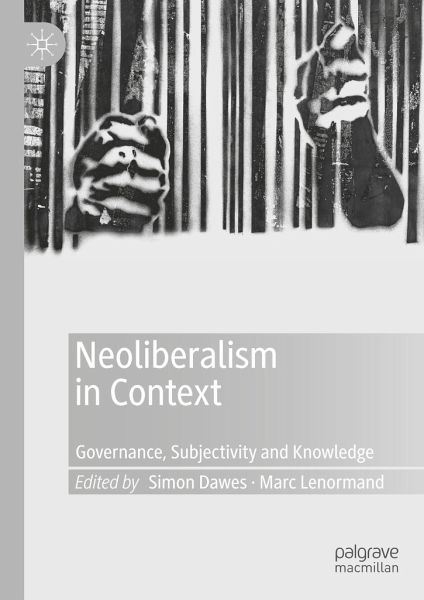
Neoliberalism in Context
Governance, Subjectivity and Knowledge
Herausgegeben: Dawes, Simon; Lenormand, Marc

PAYBACK Punkte
38 °P sammeln!
Neoliberalism in Context adopts a processual, relational and contextual framework, bringing together contributions from diverse national and disciplinary contexts, and bridging theoretical and methodological approaches to critiquing neoliberalism.The book presents arguments on the extent to which we are still living in neoliberal times, and illustrates examples of variation in the practice of neoliberalization and within neoliberal thought. The contributions also examine the mediation and significance of existing neoliberalism on subjectivity, and address the consequences of the neoliberalizat...
Neoliberalism in Context adopts a processual, relational and contextual framework, bringing together contributions from diverse national and disciplinary contexts, and bridging theoretical and methodological approaches to critiquing neoliberalism.
The book presents arguments on the extent to which we are still living in neoliberal times, and illustrates examples of variation in the practice of neoliberalization and within neoliberal thought. The contributions also examine the mediation and significance of existing neoliberalism on subjectivity, and address the consequences of the neoliberalization of education for critical thinking generally, and for the critique of neoliberalism in particular.
This collection will be of interest to students and scholars across sociology, international relations, urban studies, and media and cultural studies.
To access an introduction by Simon Dawes, and an interview with Jamie Peck, download the front and back matter for free from SpringerLink.
The book presents arguments on the extent to which we are still living in neoliberal times, and illustrates examples of variation in the practice of neoliberalization and within neoliberal thought. The contributions also examine the mediation and significance of existing neoliberalism on subjectivity, and address the consequences of the neoliberalization of education for critical thinking generally, and for the critique of neoliberalism in particular.
This collection will be of interest to students and scholars across sociology, international relations, urban studies, and media and cultural studies.
To access an introduction by Simon Dawes, and an interview with Jamie Peck, download the front and back matter for free from SpringerLink.












